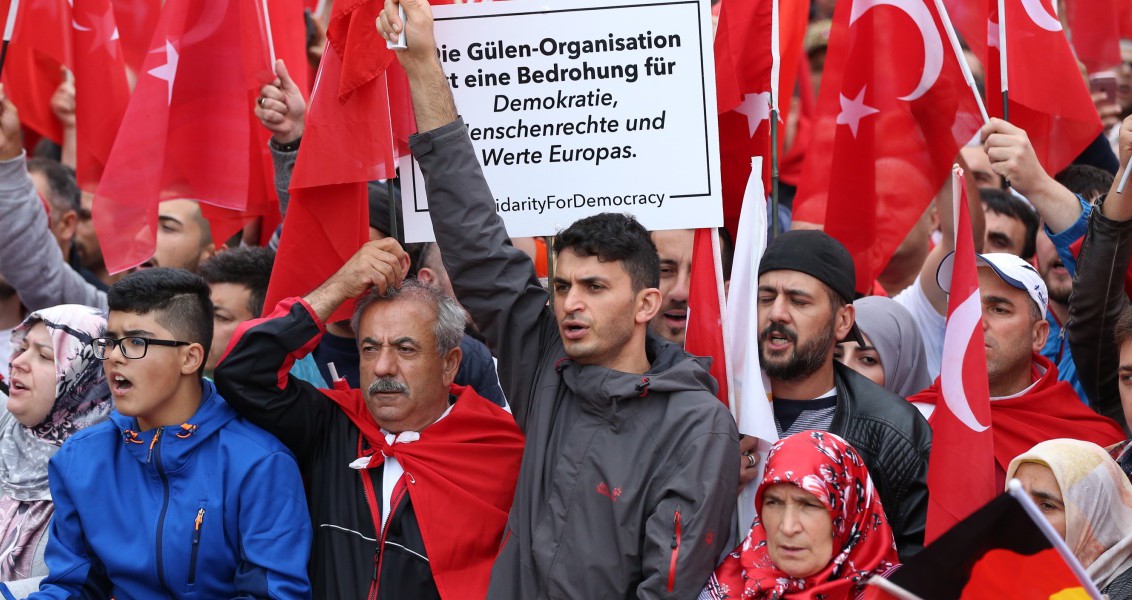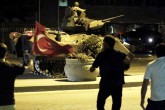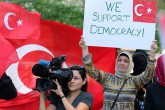Western capitals are insistent on not understanding the attempted coup of July 15. Washington has had difficulty giving a message to the Turkish public after July 15 and European capitals are confused. The U.S. is facing a critical issue of the repatriation of Gülenist Terror Organization (FETÖ) leader Fethullah Gülen. Let us suppose that it makes discourteous statements with the worry that the liquidation of the Turkish military might hinder the fight against DAESH.
Berlin and Vienna display a much more troublesome position, with German and Austrian media taking their anti-President Recep Tayyip Erdoğan broadcasting beyond allegations of authoritarianism. They are running a smear campaign through which they revive Hitler, the monster of their own history, in the person of Erdoğan with various allusions. Believe me when I say I am not concerned about analyzing the background of Germany’s current political mindset. I do not find it necessary to remind anyone that Europe has shifted toward the extreme right while dealing with many questions such as anti-migrant sentiment, Islamophobia, radicalization and terrorism. However, a point that has become very clear after July 15 draws my attention, as the anti-Turkey campaign have already ceased to be run by Justice and Development Party (AK Party) opponents in Germany and Austria. It has been turned into an important element of German and Austrian public opinion and domestic politics.
This course of affairs has reached a point where the politicians of these countries must be advised to return to sobriety. As German Foreign Ministry spokesman Martin Schaefer said, not only a “concussion in bilateral relations” is being experienced in the short term, but also that they must notice that a medium- and long-term anti-Turkey campaign will lead to a dangerous path that will problematize Turkey’s presence in Europe for their public.
The most recent example of this occurred in Germany. Tens of thousands of people joined the “democracy against coup” meeting that was organized with the support of 100 nongovernmental organizations in Cologne last Sunday. However, Berlin was disturbed that Erdoğan would join the meeting through a live video feed. Although the German Constitutional Court did not consider such participation a problem during the June 7 and Nov. 1 general elections in 2015, it did not allow Erdoğan’s participation this time on the grounds that it would be unlawful for a foreign statesman to join a meeting in Germany through a video feed. Another reason was security. German authorities are concerned about the idea of Erdoğan’s call to Turks living in Germany. In fact, they even consider it to be problematic that tens of thousands of Turks are mobilized to respond to the attempted coup in Turkey. Instead of regarding the reaction to the attempted coup, on which all of society has built a consensus, as support for Turkish democracy, they consider it a problem for themselves. They must revise their attitude of considering the coup attempt to be a scheme. They must focus on how the German public’s lack of democratic sensitivity toward the bloody coup attempt greatly frustrated Turks, as the attempt claimed 237 lives.
It is an unnecessary quest for securitization that German institutions narrow the scope of democracy for fear of Erdoğan’s influence on Turkish-German. The commitment of Turkish-Germans in Germany to Turkish democracy is a guarantee that goes beyond being a problem for German identity and politics. Turkish-Germans’ maintenance of their sense of belonging to Turkey holds an important place in their avoidance of radicalization trends in Europe. Some German media outlets’ undertaking of anti-Turkey discourse in an extreme manner is a position that must now be corrected after the coup attempt. What Europe did not do as part of the Readmission Agreement and its support of the FETÖ cannot be whitewashed with such discourse. What needs to be done is to find rational solutions based on common interests. It is time to advise for sobriety in European politics and media.
[Daily Sabah, August 3, 2016]
In this article
- Foreign Policy
- Opinion
- 2015
- 2016
- Adolf Hitler
- Anti-Islam
- Anti-Muslim
- Anti-Turkish Sentiment | Anti-Turkism | Turkophobia | Turkish Fear
- Austria
- DAESH
- Daily Sabah
- Elections
- Europe
- Extreme Right
- Far-Right
- Fight against DAESH
- Fight Against Terror
- Germany
- Islam
- Islamophobia
- Marginal Right
- Recep Tayyip Erdoğan
- Terror
- Terrorism
- The President of the Republic of Türkiye
- Turkish President
- Turkish-German Relations
- Türkiye-Germany Relations
- Türkiye's Justice and Development Party | AK Party (AK Parti)
- United States (US)
- Xenophobia



